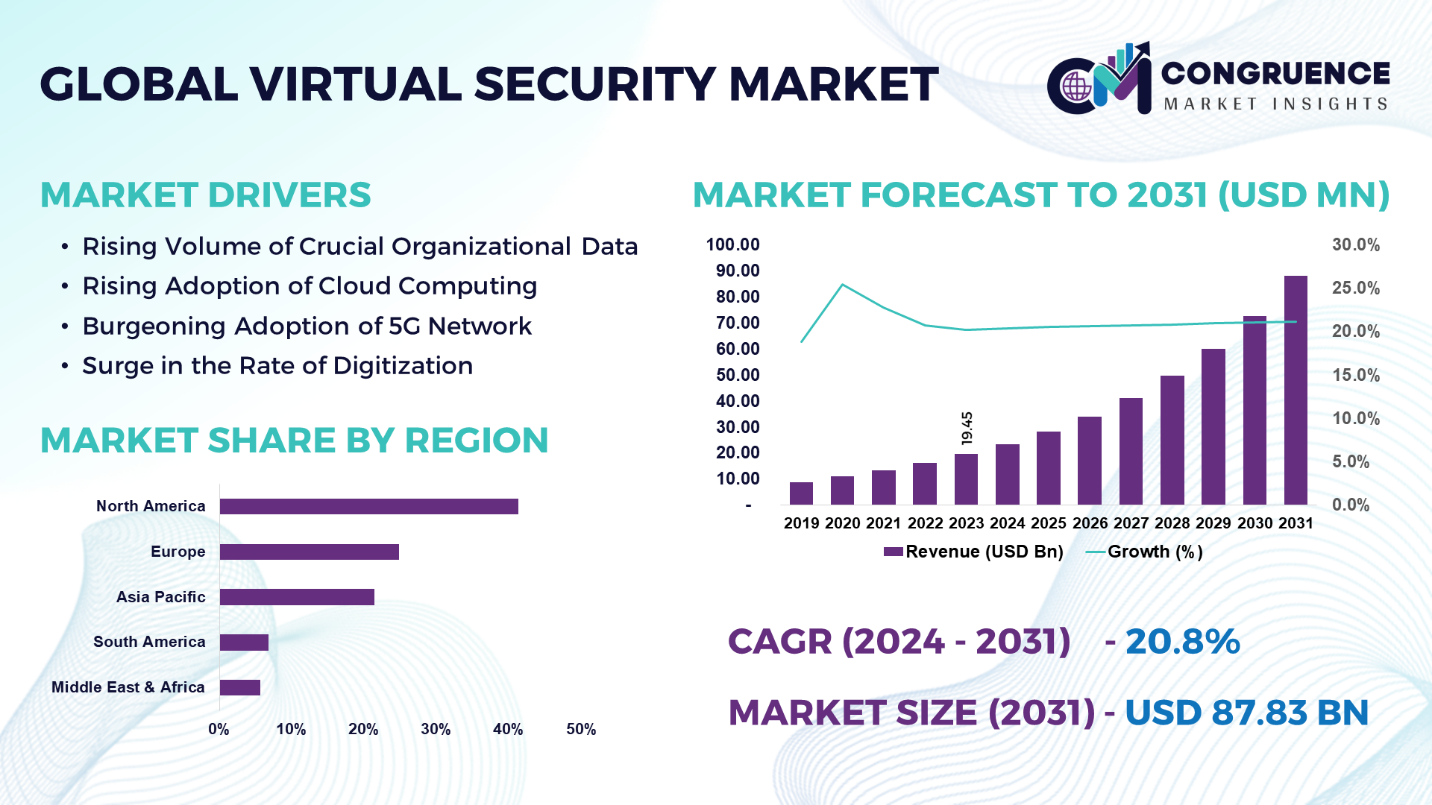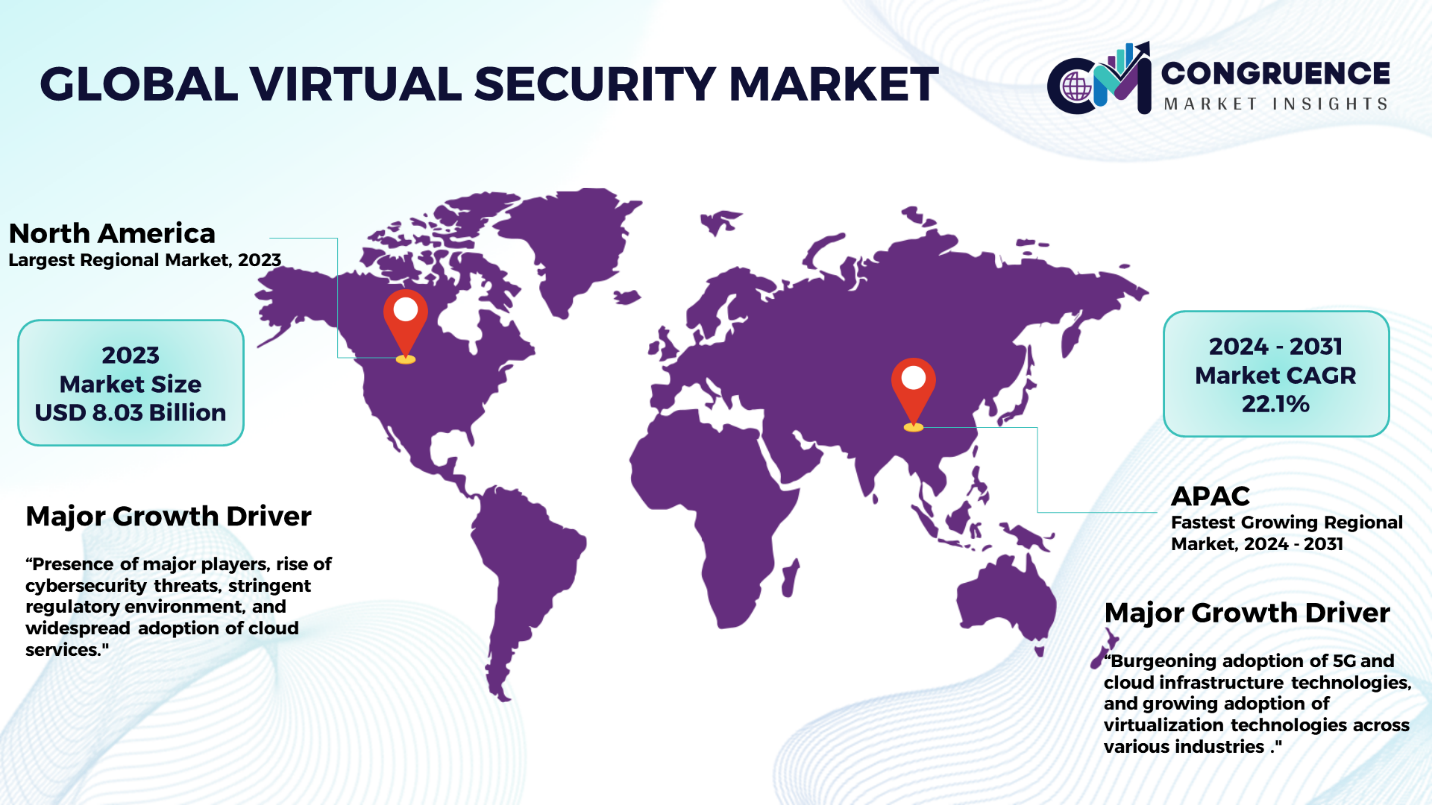Reports
The Global Virtual Security Market was valued at USD 19.45 Billion in 2023 and is anticipated to reach a value of USD 87.83 Billion by 2031 expanding at a CAGR of 20.8% between 2024 and 2031.
Virtual security is also known as virtualization security refers to software-based designed to work within a virtualized IT environment. Virtualization has significantly impacted the IT and network area, with immense cost savings and returns from data centers, companies, or cloud computing investments. Virtual security solution is all about protecting digital systems, networks, and data from cyber threats. This is a rapidly growing industry as technology advances. Organization require advanced security solutions to keep their information safe from cyber-attacks. With the increasing use of cloud computing, IoT devices, artificial intelligence, and machine learning, the demand for virtual security solutions is growing. The market is witnessing significant growth in recent years due to factors such as rising volume of crucial organizational data, rising adoption of cloud computing, burgeoning adoption of 5G network, and surge in the rate of digitization. The virtual security market serves BFSI, IT & Telecom, healthcare, retail, electronics, manufacturing, and other industries.

Virtual Security Market Major Driving Forces
Rising Volume of Crucial Organizational Data: One of the major factor driving the market growth is an increase in the volume of critical organizational data. The increasing focus of the product developers towards the adoption of new and advanced secure technology due to growing number of cases of identify fraud and the strengthening of the information technology industry.
Rising Adoption of Cloud Computing: The increasing popularity of cloud computing solutions is a major driver of virtual security market. The rising adoption of cloud-based security solutions to improve the productivity and efficiency is influencing the growth of the market.
Burgeoning Adoption of 5G Network: The increasing adoption of 5G connectivity is expected to proliferate the need for virtual security solutions. 5G networks provide higher data speed leading to increased data volumes, this surge in data traffic require robust virtual security solutions.
Surge in the Rate of Digitization: Increase in the rate of digitalization particularly in developing economies is driving adoption of virtual security solutions in small and medium sized enterprises. Rising deployment of advanced technologies such as internet of things, and increase in the number of cyber-attacks necessitate virtual security solutions.
Virtual Security Market Key Opportunities
Growing Burden of Cyber Threats: The increasing burden of cyber threats is expected to provide lucrative opportunities for market expansion. The increasing incidences of cyber-attacks on financial organizations, IT companies, and other industries are leading to increase in adoption of virtual security solutions to address the security challenges.
Artificial Intelligence and Machine Learning: The rise in incorporation of artificial intelligence, and machine learning is anticipated to create opportunities to develop advanced security solutions. Many vendors are putting efforts into the technology to develop next-generation artificial intelligence and machine learning solutions, which may help in real-time threat detection, and automated response.
Widespread Adoption of Virtualization Technologies: Widespread adoption of virtualization technologies across various sectors to keep their information safe provide opportunities for market growth. With the increasing use of cloud computing, IoT devices, and emerging technologies, the demand for virtual security solutions is growing.
Virtual Security Market Key Trends
· Widespread adoption of virtualization technologies across various organizations is a significant factor driving the market growth
· Ongoing digital transformation initiatives by many organizations owing to changing market conditions and client needs is driving adoption of virtual security solutions
· An increase in the volume of critical organizational data is a significant trend in the market that influencing the demand for virtual security solutions
· Virtualization security technology has gained high popularity in recent years, owing to the rise in the adoption of cloud computing solutions globally
· The rise in incorporation of artificial intelligence-based infrastructure in various sectors, such as IT, BFSI, and government drive demand for virtual security solutions
· The growing burden of cyber threats is another significant factor accelerating the virtualization security market growth
· The burgeoning adoption of 5G and cloud infrastructure technologies will proliferate the requirement for virtualization security solutions
Region-wise Market Insights
North America accounted for the largest market share at 41.3% in 2023 whereas, Asia Pacific is expected to register the fastest growth, expanding at a CAGR of 22.1% between 2024 and 2031.

In North America, the dominance is due to the presence of major players, rise of cybersecurity threats, stringent regulatory environment, and widespread adoption of cloud services. Furthermore, leading cybersecurity providers in North America are increasingly focused on developing innovative solutions to meet the changing threats. Europe has robust technology background, and strong adoption of cloud infrastructure drives demand for virtual security solutions for better security. In Asia-Pacific, the market is characterized by burgeoning adoption of 5G and cloud infrastructure technologies, and growing adoption of virtualization technologies across various industries which has created an increasing demand for virtual security solutions. The Middle East and Africa has been witnessing a growing demand for virtual security solutions due to digital transformation and cloud adoption whereas, in South America, the market is influenced by economic conditions, with adoption of digital technologies, and increasing incidences of cyber-attacks.
Market Competition Landscape
The global virtual security market is characterized by intense competition with the presence of well-established vendors operating in the industry. These major companies are increasingly focused on developing innovative solutions to meet the changing threats in the market. Key players in the virtual security market engage in various growth strategies aimed at gaining a competitive edge. These strategies include product innovation, product approvals, partnerships, collaborations, and integration of emerging technologies to meet evolving consumer preferences. Established brands leverage their reputation for quality and reliability to maintain market share, while newer entrants focus on disruptive innovations and unique selling propositions.
Key players in the global virtual security market implement various organic and inorganic strategies to strengthen and improve their market positioning. Prominent players in the market include:
· Trend Micro Inc.
· Broadcom
· Juniper Networks, Inc.
· Fortinet, Inc.
· Sophos Ltd.
· Cisco Systems, Inc.
· IBM Corporation
· Intel Corporation
· HyTrust
· McAfee, LLC
· Check Point Software Technologies Ltd.
· HP Development Company LP
· Symantec Corporation
· Infosys Limited
|
Report Attribute/Metric |
Details |
|
Market Revenue in 2023 |
USD 19.45 Billion |
|
Market Revenue in 2031 |
USD 87.83 Billion |
|
CAGR (2024 – 2031) |
20.8% |
|
Base Year |
2023 |
|
Forecast Period |
2024 – 2031 |
|
Historical Data |
2019 to 2023 |
|
Forecast Unit |
Value (US$ Mn) |
|
Key Report Deliverable |
Revenue Forecast, Growth Trends, Market Dynamics, Segmental Overview, Regional and Country-wise Analysis, Competition Landscape |
|
Segments Covered |
· By Component (Solution, and Services) · By Deployment Mode (On-premises, Cloud-based) · By Organization Size (SMEs, and Large Enterprises) · By Industry (BFSI, IT & Telecom, Healthcare, Retail, Electronics, Manufacturing, and Others) |
|
Geographies Covered |
North America: U.S., Canada and Mexico Europe: Germany, France, U.K., Italy, Spain, and Rest of Europe Asia Pacific: China, India, Japan, South Korea, Southeast Asia, and Rest of Asia Pacific South America: Brazil, Argentina, and Rest of Latin America Middle East & Africa: GCC Countries, South Africa, and Rest of Middle East & Africa |
|
Key Players Analyzed |
Trend Micro Inc., Broadcom,Juniper Networks, Inc.,Fortinet, Inc.,Sophos Ltd.,Cisco Systems, Inc.,IBM Corporation,Intel Corporation,HyTrust,McAfee, LLC,Check Point Software Technologies Ltd.,HP Development Company LP,Symantec Corporation, andInfosys Limited |
|
Customization & Pricing |
Available on Request (10% Customization is Free) |
